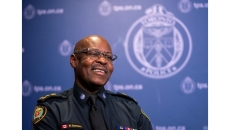The death of her brother weighs on Prairie Crowe's mind.
Nicholas Dinardo is alive, but behind bars. The 28-year-old Indigenous man has attempted suicide multiple times and spent long stints in isolation, she says, including more than 200 days while he was in remand before his current five-year sentence for aggravated assault, assault with a weapon and mischief to property.
When her brother's feeling good, he jokes around, Crowe says. He also writes poetry and reads it to her during their phone calls.
But being alone has taken its toll on her younger brother and he's struggling, says the 35-year-old Regina woman.
"He has these episodes where he comes very, very close to committing suicide and we always worry that he'll be successful," Crowe told The Canadian Press.
"I don't want my brother to die."
On Friday, Dinardo filed a complaint with the Canadian Human Rights Commission against the Correctional Service of Canada (CSC). The complaint alleges his distress has been met with force by corrections staff and exacerbated by an absence of mental-health care.
Dinardo outlines how he's Cree from Saskatchewan's Piapot First Nation, but was born in North Vancouver to a mother who lived through residential schools.
He's serving his third federal sentence, the complaint says.
It says Dinardo has been transferred back and forth between maximum-security facilities and prison treatment centres for his suicide attempts and self-harm.
"I have swallowed glass and razor blades, climbed the razor wire, tried to hang myself, refused blood transfusions and gone on hunger strikes to try to kill myself."
The complaint says Dinardo has been diagnosed with post-traumatic stress disorder and, despite hearing voices, hasn't been to a psychiatrist in about six months.
He says he struggles being on regular units at Kent Institution in British Columbia and acts out. He says he spent three months this year on a structured intervention unit for inmates who can't be in the regular population. He hardly left his cell, he says.
The federal government has said inmates in such units get a chance to spend at least four hours a day outside their cell and receive better support for their mental needs.
Over the years, Dinardo has lived in other isolated conditions, his complaint says. He alleges being met with force by corrections staff after self-harming.
"Instead of providing him with culturally appropriate healing services to help him address his own trauma ... CSC responds to him with uses of force," said Jennifer Metcalfe, executive director of the B.C-based Prisoners' Legal Services, which is helping Dinardo with his complaint.
"They recently shot him in the face with a rubber bullet," she said.
A spokeswoman with the Correctional Service of Canada said she couldn't comment on a specific offender's case, citing privacy legislation.
Marie Pier Lecuyer said inmates have access to mental-health care based on their assessments, with screening for suicide upon arrival at a facility. Corrections staff are also trained to "respond immediately to preserve life and prevent bodily harm."
"Where enhanced observation is required to ensure the safety of an inmate who is vulnerable to suicide, this is done for the shortest time required with ongoing involvement of health-care professionals," she said.
Metcalfe says Dinardo's case is like many others. She notes that she and other advocates continue to point out the over-representation of Indigenous peoples in Canada's prisons.
The Office of the Correctional Investigator has raised concerns about the use of force reported at treatment centres and the psychological effects of being isolated.
In the 2018-19 annual report, the federal watchdog stated that human rights are violated when incarnated people are "punished" for behaviours tied to underlying mental-health issues.
Dinardo details one time this year when, upon returning to his maximum-security prison after self-harming, he was put in restraints.
"After about three hours, they finally let me use the washroom and afterwards I refused to be strapped down again. They hosed me down with pepper spray," his complaint reads.
Once restrained again, he wasn't allowed to go to the bathroom alone and soiled himself, Dinardo writes.
"It was several hours before I was allowed to go clean myself. I was so distressed that I flipped the ... board over twice, hitting my head on the ground. At some point I began spitting up blood."
Dinardo's complaint says he's at a regional treatment centre, where he wants to stay. He was taken there this month after he cut himself in an observation cell.
His statutory release is set for March 2022.
“I worry all the time that he won’t make it," his sister says.






